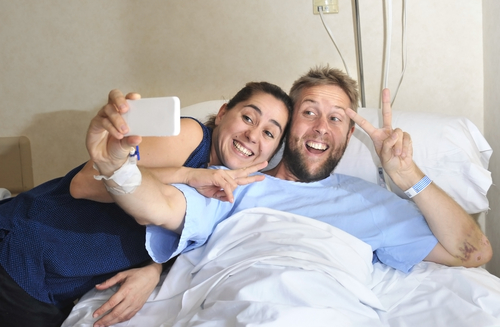
Yes and yes.

Yes and yes.
While they may not be the primary target for every healthcare specialty, this group, now as old as their early 30s, consumes healthcare. Urgent care, emergency, maternity and pediatrics are among their needs, along with a host of wellness products—especially preventative care products and services. Some of their baby boomer parents are on the cusp of retirement so senior care issues are on the horizon for Millennials, too.
The Attention Deficit Issue
As a generation that has grown up in the Information Age, Millennials can’t help having short attention spans. They have learned by necessity to filter information and self-select based on their interests or immediate needs. They use aggregator sites like Reddit, the Skimm and Buzzfeed. They will also go to your social media pages before they go to your website; a recent study showed that Millennials are five times more likely to trust a pharma-sponsored social media platform than Baby Boomers, and nearly three times more likely than consumers between 45 and 65.
What’s more, younger Millennials are migrating toward visual-based sites including Instagram, Pinterest, Vine and Periscope. Facebook, Twitter and LinkedIn are also still relevant but losing younger Millennials’ interest.
Thus, if you’re a healthcare marketer targeting Millennials in the places to which they turn for information, you must develop and present content in short, relevant chunks with no fluff—as if your entire audience had attention deficit disorder. Short videos, images and creative visuals that can get a point across in a single view are best (think infographics and slide shows). And, everything must be sharable via social media.
This may seem difficult with more complex healthcare topics, but savvy healthcare marketers are learning how to make it work; the campaign rolled out by New York state health insurer Oscar to guide Millennials through ACA enrollment was tremendously successful; it recruited local photographers to share photos on social media sites and achieved 500% growth with 150,000 engagements.
The same strategies can easily be applied to provider-supplied information including health education. Cleveland Clinic is leading the way, as usual; check out their Instagram and Vine pages. The key to making it successful (and not just fun) is to create a funnel or journey with various stops where viewers can digest your messages little by little, forming a relationship with you along the way. The challenge is making it interesting enough to make them want to be in a relationship with you.
A blog is the most they will read, and it will backfire if you do it wrong.
If they are going to read any “long form” content, it’s most likely a blog. Experts vary on the ideal blog length, but it ranges from 600 to 1,500 words (this one is 810). A blog of 2,000 words or more is like “War and Peace” from a Millennial’s perspective.
So, in addition to the telegraph-style comunication expected in social media, you must blog if you are going to influence Millennials’ healthcare decisions. According to a recent survey from Elite Daily, the majority of Millennials expect brands—whether they’re consumer products or healthcare—to publish content online before they make purchases. Thirty percent of survey respondents selected blogs as a top media source before making a purchase. On the flipside:
- Fewer than three percent ranked TV news and magazines as influencing their buying decisions
- Only one in 100 said an ad would translate to brand trust
- Family inheritance and student loans do not impact buying decisions (contrary to popular belief)
Blogging for the sake of blogging won’t be effective. You must provide Millennials with non-biased, non-promotional information that will help them make their healthcare decisions; if they detect sales speak, they may shut you out for good. Third-party credibility is also important, and not necessarily from a medical expert. They trust online reviews from other consumers, so you will have to accept that there may be negative reviews about your organization or the quality of your care. Just hope that there are far more positive reviews than negative ones.
Other good blogging strategies include:
- Offering to guest blog on sites Millennials trust
- Inviting credible guest bloggers to your site
- Pitching your medical experts to popular health bloggers
- Treating trusted health bloggers like reporters. Bloggers are constantly looking for great ideas from credible sources – approach them as you would any other reporter with sources, images, and your latest news.
One of Shakespeare’s most famous lines from “Hamlet” was, “Brevity is the soul of wit.” Not every Millennial knows the line, but they certainly know its meaning.